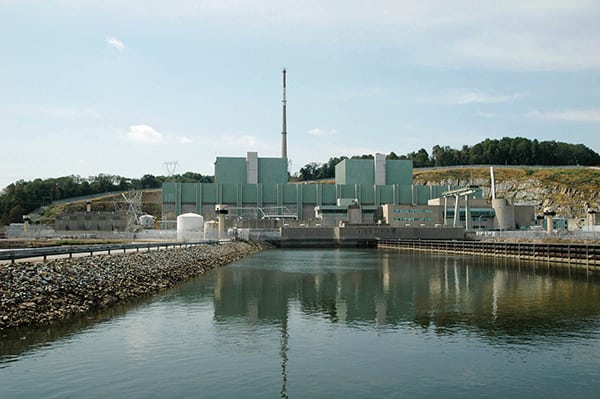Exelon’s Peach Bottom Nuclear Plant Licensed for 80 Years—Will It Make It?
Credit to Author: Aaron Larson| Date: Thu, 12 Mar 2020 13:31:18 +0000
The post Exelon’s Peach Bottom Nuclear Plant Licensed for 80 Years—Will It Make It? appeared first on POWER Magazine.
The U.S. Nuclear Regulatory Commission (NRC) granted a 20-year license extension for Peach Bottom Atomic Power Station Units 2 and 3. The extension authorizes the two reactors—both of which began commercial operation in 1974—to continue operating through 2054.
“We are pleased with the NRC’s decision to grant a subsequent license renewal for Peach Bottom Units 2 and 3,” Bryan Hanson, Exelon Nuclear chief nuclear officer, said in a press release. “This plant is well suited to continue running safely, reliably and efficiently, given the extensive upgrades accomplished over the past seven years.”
The Peach Bottom facility was recognized by POWER with a Top Plant award in 2016 after Exelon finished extended power uprates (EPUs) on both units, increasing thermal output by 12.4%. The list of projects completed during the Peach Bottom EPU outages was extensive, including retrofitting high- and low-pressure turbines, replacing generator rotors, upgrading isophase buses and ducts, replacing steam dryers, and much more. Those projects added roughly 270 MW of electrical output, bringing the total station capacity to about 2,600 MW.

Lobbying for Support of Nuclear Power
“The ability to operate Peach Bottom for another 20 years is good news for the environment, our employees and the community,” Hanson said. “However, nuclear plants must remain financially viable to continue to operate. It’s critical that we continue to pursue policy reforms that value the environmental, economic and reliability benefits that zero-carbon nuclear energy provides.”
Exelon, which operates the largest fleet (21 reactors) of nuclear plants in the U.S., has lobbied strongly for years to obtain government support for nuclear power. The company was successful in getting legislation passed in Illinois and New York that provides financial incentives for some of its plants. Government investigations, however, have put Exelon under a microscope as a result of its lobbying activities.
Exelon received a grand jury subpoena in the second quarter of 2019 from the U.S. Attorney’s Office for the Northern District of Illinois, requiring production of information concerning the company’s lobbying activities in the state. On Oct. 4, 2019, Exelon received a second grand jury subpoena, requiring production of records of any communications with certain individuals and entities. On Oct. 22, 2019, the U.S. Securities and Exchange Commission (SEC) notified Exelon that it had also opened an investigation into the company’s lobbying activities.
Exelon said it has cooperated fully, including by providing additional information requested by the U.S. Attorney’s Office and the SEC. However, it admitted that the outcome of the investigations cannot be predicted and could subject Exelon “to criminal or civil penalties, sanctions or other remedial measures.” Exelon has acknowledged that even the appearance of non-compliance with anti-corruption and anti-bribery laws could have an adverse impact on the company’s reputation or relationship with regulatory and legislative authorities, customers, and other stakeholders, as well as on its consolidated financial statements.
Tough Times for Nuclear Plants
The Peach Bottom facility is located in Delta, Pennsylvania—one of the states in which Exelon has failed to secure subsidies for financially struggling units. Exelon had pressured Pennsylvania lawmakers during the 2019 session with the threat of closing the Three Mile Island Nuclear Station (TMI) in hopes of getting supportive measures enacted, but the effort fell flat.
Exelon ultimately retired TMI, taking it offline for the final time on Sept. 20, 2019, even though its license would have allowed operation for almost 15 more years. The outcome was driven by economics rather than operational issues. In fact, the station set a record during its final run, operating for 709 continuous days prior to the planned shutdown, beating its previous mark of 705 days set in 2009.
Other units have also been retired long before their licenses expired, including Kewaunee, Vermont Yankee, Fort Calhoun, and Pilgrim, so obtaining a license extension is no guarantee of long-term operation for the Peach Bottom facility. Still, Hanson said the news is positive.
If Peach Bottom continues to run through 2054, Exelon estimates that its clean energy production would avoid more than 536 million tons of carbon from entering the atmosphere. In addition to environmental benefits, the facility supports the local economy. Peach Bottom employs 750 people full time with a payroll totaling $84.6 million annually. In addition to full-time staff, the plant employs an average of 1,800 additional contractors and union craftspeople annually during refueling outages.
“This license renewal is extremely important for our employees and the local community,” said Peach Bottom’s Site Vice President Pat Navin. “The opportunity for long-term employment helps build a more stable community. Our employees also give of their time, talent and funds to charitable organizations surrounding the plant, which benefits everyone.”
—Aaron Larson is POWER’s executive editor (@AaronL_Power, @POWERmagazine).
The post Exelon’s Peach Bottom Nuclear Plant Licensed for 80 Years—Will It Make It? appeared first on POWER Magazine.